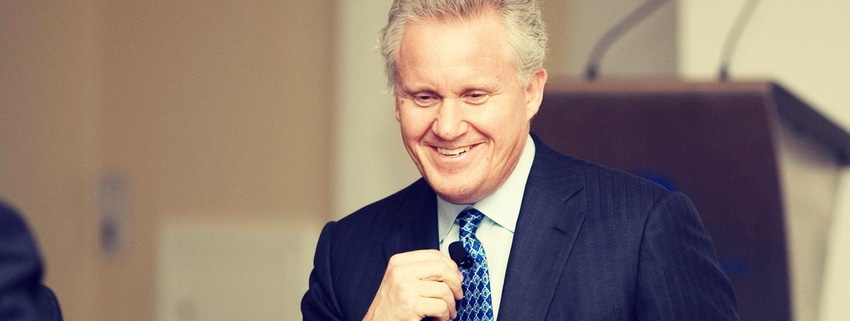With CEO and IoT champion Jeffrey Immelt stepping down, questions emerge about GE’s IoT strategy. Where will new CEO John Flannery take the company?
June 14, 2017

Leadership changes at GE likely won’t shift the company’s focus on developing and delivering IoT products boosted by former CEO Jeffrey Immelt and GE Digital, according to industry analysts, and some think the industrial giant may actually strengthen IoT efforts. GE announced Monday that Immelt will leave the company this summer.
For its part, in response to a request for comment on whether leadership changes would affect the GE Internet of Things strategy, GE said via email that incoming CEO “John Flannery will be focused on continuing to grow a world-class, highly digital industrial technology company that delivers the products and services that drive outcomes for our customers. Digital is central to our strategy and we will continue the momentum.”
Given GE’s industrial roots, its transformation into a digital industrial company, and the necessity of continuing innovation and leadership in the IoT space—it would be very surprising if GE didn’t push forward with IoT innovation, according to Bob O’Donnell, president, founder and chief analyst of TECHnalysis Research.
“They might if anything want to kick it up further,” O’Donnell said. “It’s going to be at least as strong, if not stronger.”
Newly appointed CEO Flannery’s strong financial background makes it likely that the GE IoT strategy will home in on elements of its industrial IoT portfolio that can increase its margins with software that helps its customers do the same, according to John Myers, managing research director of analytics and BI for Enterprise Management Associates. At the same time, GE will likely reduce focus on newer, B2B IoT initiatives that are “more fuzzy.” For instance, leveraging sensor data to help improve the fuel efficiency of jet engines or ensure locomotive safety are areas that have a much easier path to IoT implementation and ROI than, say, some of GE’s IoT initiatives in the B2B markets.
“These are areas where GE can impact a customer’s business model,” Myers said.
Given Flannery’s experience as president and CEO of GE Healthcare, it’s possible that the GE Internet of Things strategy will include a greater push for IoT products developed for the healthcare industry, many analysts interviewed agreed.
Under Immelt’s 16-year tenure, GE embarked on a digital transformation that included launching an IoT product portfolio that has amassed leadership in the Industrial IoT space and prompted much excitement in manufacturing and asset-intensive industries, according to Matthew Littlefield, president and principal analyst at LNS Research. GE currently has several products in its IoT portfolio, including Predix, its IoT platform, and two sets of applications built on that platform: Asset Performance Management and Brilliant Manufacturing.
“They’re one of the first big industrial companies to launch a digital division and a platform,” he said. “But it’s still pretty new and a lot needs to be done.”
While that investment has been significant, Ray Wang, founder and principal analyst for Constellation Research, agrees there’s still more ahead. How Flannery treats the level of IoT investment and how he handles headcount will determine the future of GE—a future in which spinning off GE Digital as a private entity can’t be ruled out.
“The question is, How will the new CEO react to [Wall] Street and give his vision on what GE will stand for?” he wrote via email interview. “IoT and GE Digital are now the crown jewels at GE. So let’s see if he will make the right long-term bets or keep carving GE up.”
About the Author(s)
You May Also Like
.png?width=700&auto=webp&quality=80&disable=upscale)
.png?width=700&auto=webp&quality=80&disable=upscale)

.png?width=300&auto=webp&quality=80&disable=upscale)
.png?width=300&auto=webp&quality=80&disable=upscale)
.png?width=300&auto=webp&quality=80&disable=upscale)
